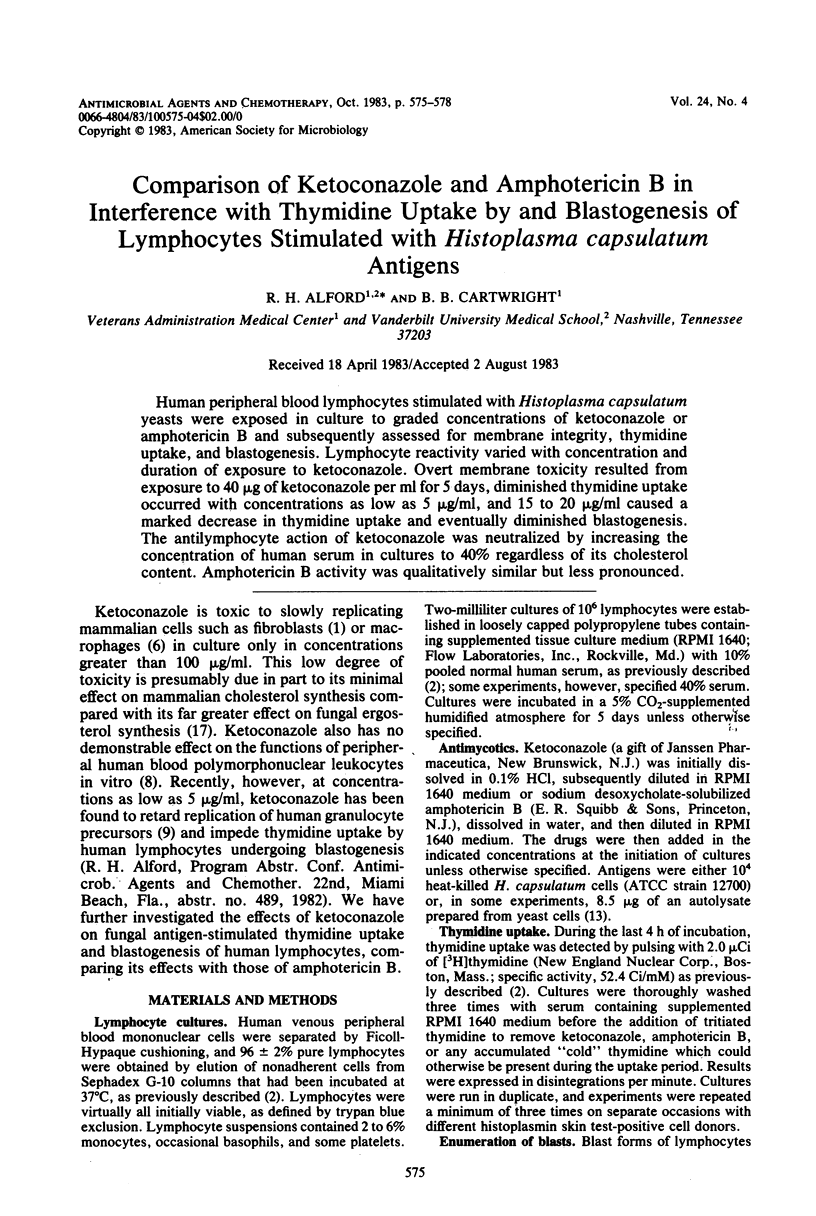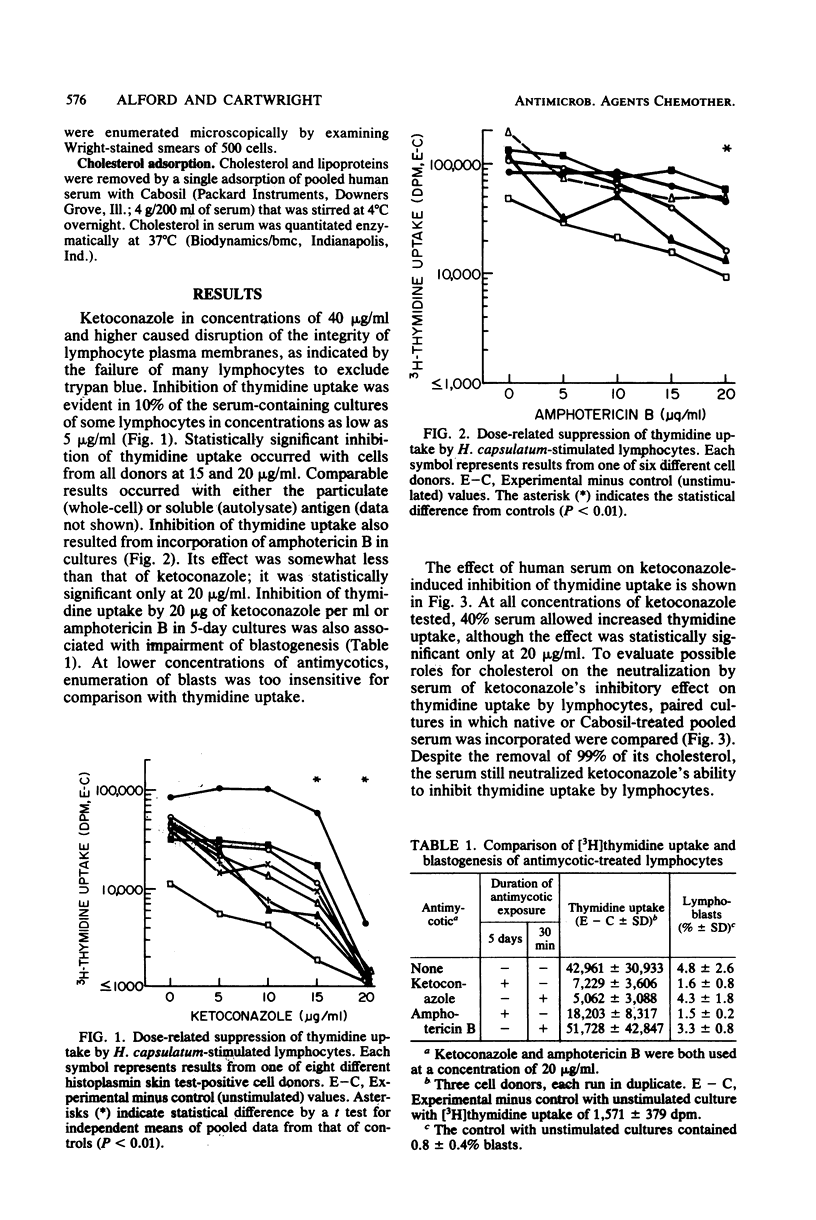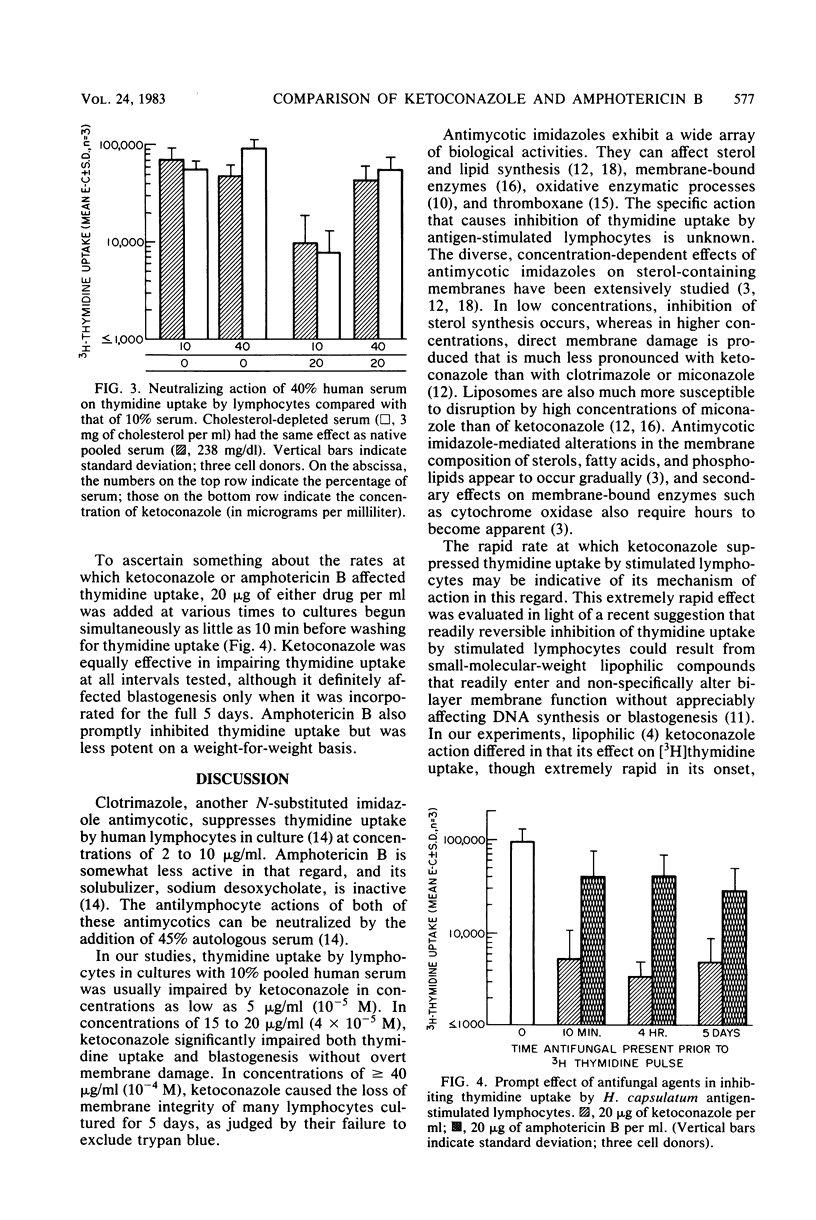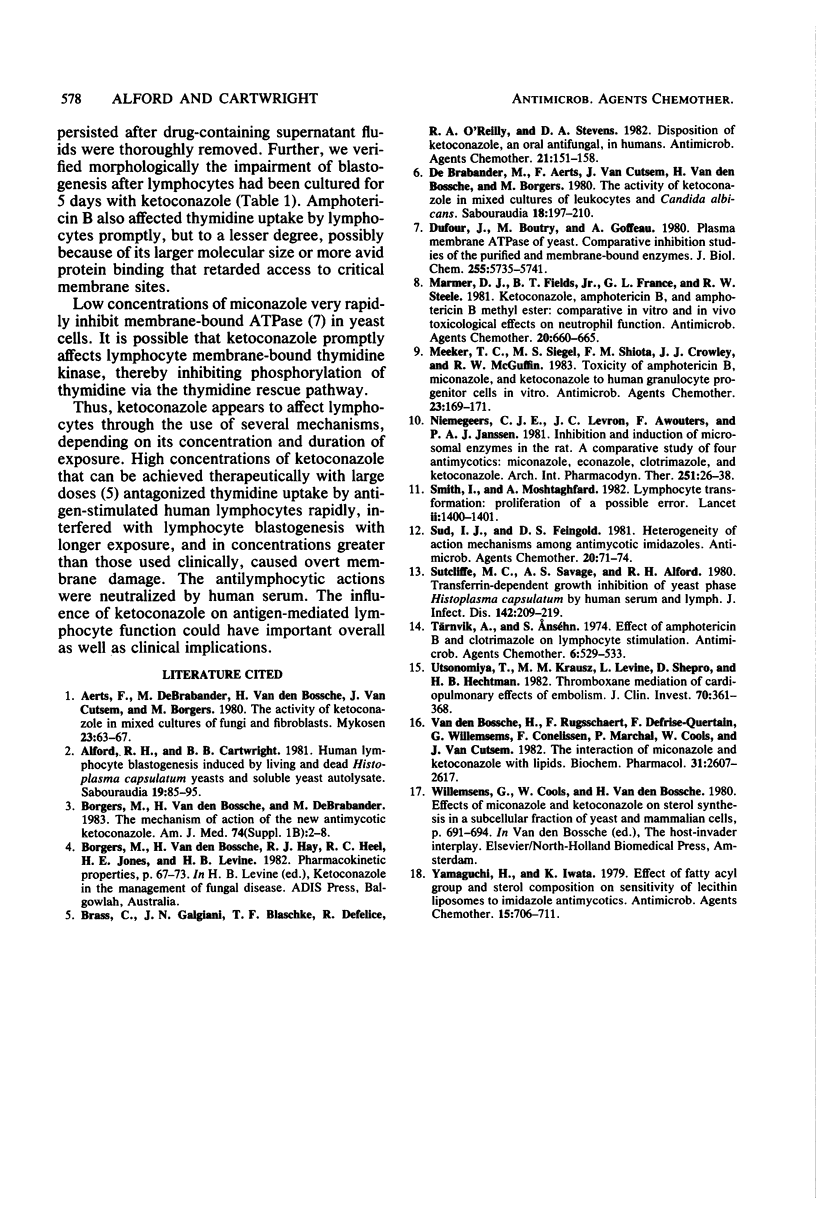Abstract
Human peripheral blood lymphocytes stimulated with Histoplasma capsulatum yeasts were exposed in culture to graded concentrations of ketoconazole or amphotericin B and subsequently assessed for membrane integrity, thymidine uptake, and blastogenesis. Lymphocyte reactivity varied with concentration and duration of exposure to ketoconazole. Overt membrane toxicity resulted from exposure to 40 micrograms of ketoconazole per ml for 5 days, diminished thymidine uptake occurred with concentrations as low as 5 micrograms/ml, and 15 to 20 micrograms/ml caused a marked decrease in thymidine uptake and eventually diminished blastogenesis. The antilymphocyte action of ketoconazole was neutralized by increasing the concentration of human serum in cultures to 40% regardless of its cholesterol content. Amphotericin B activity was qualitatively similar but less pronounced.
Full text
PDF



Selected References
These references are in PubMed. This may not be the complete list of references from this article.
- Aerts F., De Brabander M., van den Bossche H., van Cutsem J., Borgers M. The activity of ketoconazole in mixed cultures of fungi and human fibroblasts. Mykosen. 1980 Feb;23(2):53–67. doi: 10.1111/j.1439-0507.1980.tb02581.x. [DOI] [PubMed] [Google Scholar]
- Alford R. H., Cartwright B. B. Human lymphocyte blastogenesis induced by living and dead Histoplasma capsulatum yeasts and soluble yeast autolysate. Sabouraudia. 1981 Jun;19(2):85–95. [PubMed] [Google Scholar]
- Borgers M., Van den Bossche H., De Brabander M. The mechanism of action of the new antimycotic ketoconazole. Am J Med. 1983 Jan 24;74(1B):2–8. doi: 10.1016/0002-9343(83)90507-7. [DOI] [PubMed] [Google Scholar]
- Brass C., Galgiani J. N., Blaschke T. F., Defelice R., O'Reilly R. A., Stevens D. A. Disposition of ketoconazole, an oral antifungal, in humans. Antimicrob Agents Chemother. 1982 Jan;21(1):151–158. doi: 10.1128/aac.21.1.151. [DOI] [PMC free article] [PubMed] [Google Scholar]
- Dufour J. P., Boutry M., Goffeau A. Plasma membrane ATPase of yeast. Comparative inhibition studies of the purified and membrane-bound enzymes. J Biol Chem. 1980 Jun 25;255(12):5735–5741. [PubMed] [Google Scholar]
- Marmer D. J., Fields B. T., Jr, France G. L., Steele R. W. Ketoconazole, amphotericin B, and amphotericin B methyl ester: comparative in vitro and in vivo toxicological effects on neutrophil function. Antimicrob Agents Chemother. 1981 Nov;20(5):660–665. doi: 10.1128/aac.20.5.660. [DOI] [PMC free article] [PubMed] [Google Scholar]
- Meeker T. C., Siegel M. S., Shiota F. M., Crowley J. J., McGuffin R. W. Toxicity of amphotericin B, miconazole, and ketoconazole to human granulocyte progenitor cells in vitro. Antimicrob Agents Chemother. 1983 Jan;23(1):169–171. doi: 10.1128/aac.23.1.169. [DOI] [PMC free article] [PubMed] [Google Scholar]
- Niemegeers C. J., Levron J. C., Awouters F., Janssen P. A. Inhibition and induction of microsomal enzymes in rat. A comparative study of four antimycotics: miconazole, econazole, clotrimazole and ketoconazole. Arch Int Pharmacodyn Ther. 1981 May;251(1):26–38. [PubMed] [Google Scholar]
- Smith I., Moshtaghfard A. Lymphocyte transformation: proliferation of a possible error. Lancet. 1982 Dec 18;2(8312):1400–1401. doi: 10.1016/s0140-6736(82)91299-5. [DOI] [PubMed] [Google Scholar]
- Sud I. J., Feingold D. S. Heterogeneity of action of mechanisms among antimycotic imidazoles. Antimicrob Agents Chemother. 1981 Jul;20(1):71–74. doi: 10.1128/aac.20.1.71. [DOI] [PMC free article] [PubMed] [Google Scholar]
- Sutcliffe M. C., Savage A. M., Alford R. H. Transferrin-dependent growth inhibition of yeast-phase Histoplasma capsulatum by human serum and lymph. J Infect Dis. 1980 Aug;142(2):209–219. doi: 10.1093/infdis/142.2.209. [DOI] [PubMed] [Google Scholar]
- Tärnvik A., Ansehn S. Effect of amphotericin B and clotrimazole on lymphocyte stimulation. Antimicrob Agents Chemother. 1974 Nov;6(5):529–533. doi: 10.1128/aac.6.5.529. [DOI] [PMC free article] [PubMed] [Google Scholar]
- Utsonomiya T., Krausz M. M., Levine L., Shepro D., Hechtman H. B. Thromboxane mediation of cardiopulmonary effects of embolism. J Clin Invest. 1982 Aug;70(2):361–368. doi: 10.1172/JCI110625. [DOI] [PMC free article] [PubMed] [Google Scholar]
- Van den Bossche H., Ruysschaert J. M., Defrise-Quertain F., Willemsens G., Cornelissen F., Marichal P., Cools W., Van Cutsem J. The interaction of miconazole and ketoconazole with lipids. Biochem Pharmacol. 1982 Aug 15;31(16):2609–2617. doi: 10.1016/0006-2952(82)90707-9. [DOI] [PubMed] [Google Scholar]
- Yamaguchi H., Iwata K. Effect of fatty acyl group and sterol composition on sensitivity of lecithin liposomes to imidazole antimycotics. Antimicrob Agents Chemother. 1979 May;15(5):706–711. doi: 10.1128/aac.15.5.706. [DOI] [PMC free article] [PubMed] [Google Scholar]
- de Brabander M., Aerts F., van Cutsem J., van den Bossche H., Borgers M. The activity of ketoconazole in mixed cultures of leukocytes and Candida albicans. Sabouraudia. 1980 Sep;18(3):197–210. doi: 10.1080/00362178085380351. [DOI] [PubMed] [Google Scholar]


